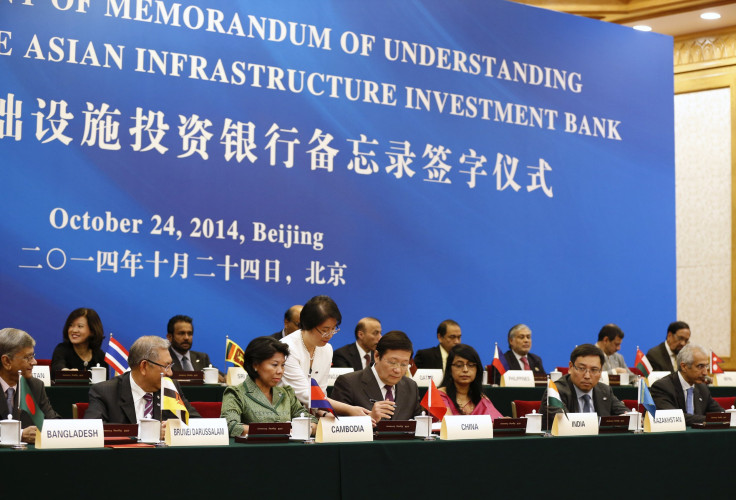US Loses Fight, China-Led AIIB Announces 57 Founding Members, Canada Also Mulls Joining In

China has announced its global financial institution Asian Infrastructure Investment Bank, or AIIB, has gathered 57 nations as founding members. They include US-allies Australia and South Korea. On Wednesday, China’s Finance Ministry announced the addition of an extra seven countries. On the same day, Canada, another key ally of the U.S., announced it also wants to join in.
The additional seven founding members were Sweden, Israel, South Africa, Azerbaijan, Iceland, Portugal and Poland according to a statement released by the ministry. The newly formed global banking institution also has four of the G7 nations, which are Britain, France, Germany and Italy. Of the 57, 37 countries were within Asia while the other 20 covered Asia, Oceania, Europe, Latin America, Africa and other continents.
The ministry likewise noted it will continue to receive applications for founding membership status despite the already lapsed March 31 deadline. Only two nations so far have been rejected to join the AIIB. They were North Korea and Taiwan.
The founding members are expected to meet in April and in May at Beijing and Singapore, respectively, to work out necessary procedures. The bank’s draft constitution is expected to be signed by the end of June.
The geographical spread of the founding member countries into the AIIB speaks volumes for China and against the U.S. "Despite the bank not being welcomed by the world's largest economy, the U.S., the participation of so many Asian, European and Latin American countries is a major diplomatic success for China which wants to have more say in international financial institutions and in the international system," Professor Selcuk Colakoglu, vice president of an Ankara-based think tank, USAK, told The Anadolu Agency.
Los Angeles Times states the U.S. has no one else to blame but itself for the split-up, because it had failed to deliver on a commitment. It had promised China and other rising nations about four years ago that it will revamp the governing rules of the IMF to reduce its voting power and help the others gain more. President Barack Obama said the U.S. will slash its voting power from 17.7 percent to 17.4 percent. This in turn would increase China’s from 4 percent to 6.4 percent. Quotas for all developing countries will likewise expand from 39.5 percent to 42.4 percent.
But the U.S. Parliament opposed the proposal, giving the impressions the superpower’s suggestions has just been all lip service. Because the BRICS and other rising economic powers had long admitted desiring a stronger voice in the global financing institutions, they decided, notably China, the world’s second-largest economy, to just create their own.
"In some sense, because we were unwilling to give some of these emerging-market countries a small increase in their voting share in the IMF, they've gone off and started another institution without us," Edwin Truman, a senior fellow with the Peterson Institute for International Economics, told LA Times.
The bank's founding members so far:
1) Austria
2) Australia
3) Azerbaijan
4) Bangladesh
5) Brazil
6) Brunei
7) Cambodia
8) China
9) Denmark
10) Egypt
11) France
12) Finland
13) Georgia
14) Germany
15) Iceland
16) India
17) Indonesia
18) Iran
19) Israel
20) Italy
21) Jordan
22) Kazakhstan
23) South Korea
24) Kuwait
25) Kyrgyzstan
26) Laos
27) Luxembourg
28) Malaysia
29) Maldives
30) Malta
31) Mongolia
32) Myanmar
33) Nepal
34) Netherlands
35) New Zealand
36) Norway
37) Oman
38) Pakistan
39) Philippines
40) Poland
41) Portugal
42) Qatar
43) Russia
44) Saudi Arabia
45) Singapore
46) South Africa
47) Spain
48) Sri Lanka
49) Sweden
50) Switzerland
51) Tajikistan
52) Thailand
53) Turkey
54) United Arab Emirates
55) United Kingdom
56) Uzbekistan
57) Vietnam
The AIIB financially support infrastructure projects in the Asia-Pacific Region, such as roads, railways, airports and others. Its initial subscribed capital will be $50 billion and will increase to $100 billion. It is expected to be established by the end of 2015.
To report problems or to leave feedback about this article, email: e.misa@ibtimes.com.au.





















